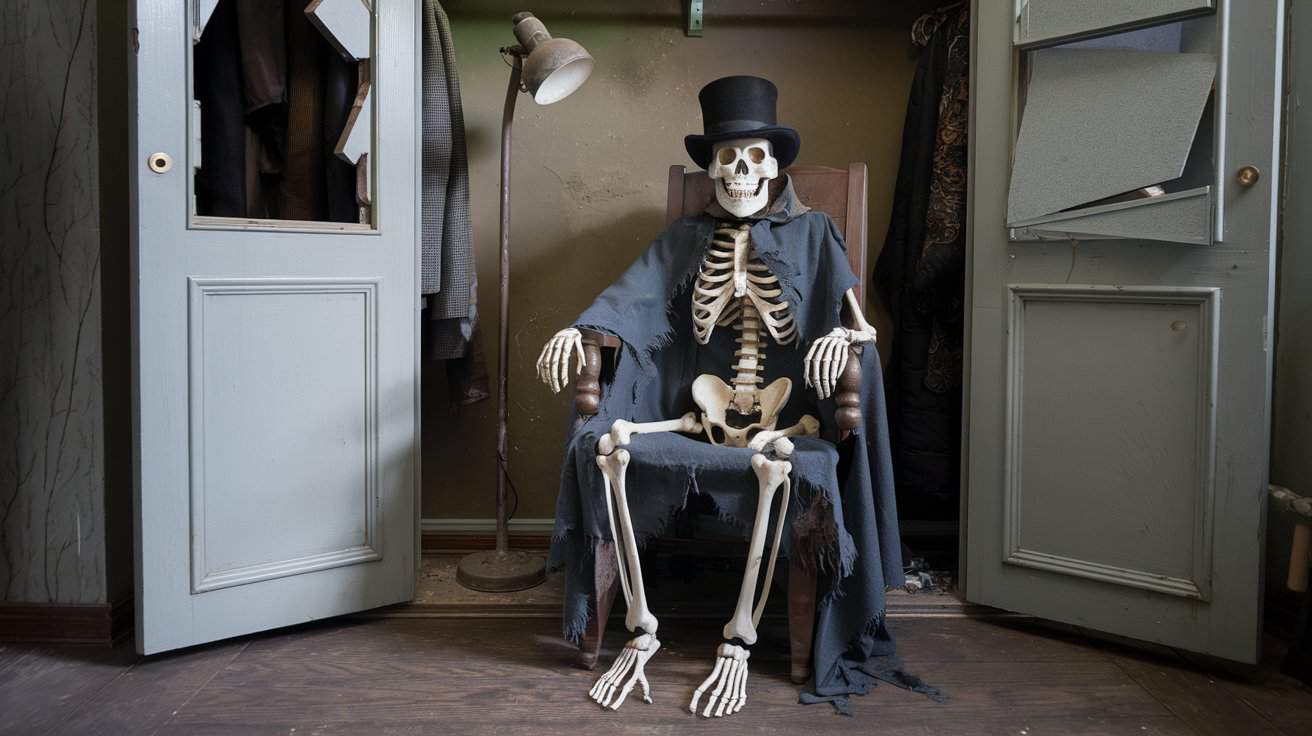Genealogy. It’s not just a hobby. It’s an obsession. A hunt for truth.
But sometimes, that truth is uglier than you bargained for. Skeletons rattle. Closets creak open.
And suddenly, you’re face-to-face with a family history that’s not all sunshine and roses.
This is the raw, unfiltered reality of where you came from.
Ready to dig in? Let’s go.
The Dirty Laundry List
What kind of skeletons are we talking about?
- Criminal ancestors. Great-grandpa wasn’t just a charming bootlegger. He was a full-blown mob enforcer.
- Abuse. Those divorce records? They tell stories of domestic violence that make your stomach churn.
- Affairs. Surprise! You’ve got a secret aunt. And uncle. And maybe a few cousins too.
- Abandoned kids. Not everyone stuck around to play happy families. Some just cut and run.
- Colonizers. Great-great-grandpa didn’t just “settle” new land. He helped displace entire communities. History’s messy.
- Slave owners. Your ancestors might’ve profited from human suffering. Cold, hard facts.
These aren’t just footnotes in dusty old books. They’re your flesh and blood. Your DNA. Part of what made you, you.
Tough to swallow? You bet. But knowledge is power. Even when it tastes like bile in your throat.
The Gut Punch
Finding this stuff doesn’t just sting. It knocks the wind out of you. Here’s what you’re in for:
Shock. Pure, unadulterated disbelief. This can’t be real, right? Wrong.
Shame. Suddenly, family reunions feel like a costume party where you’re wearing a giant “I’m related to THAT guy” sign.
Anger. At your ancestors for their actions. At yourself for digging. At the world for being so damn complicated.
It’s cognitive dissonance on steroids. You thought you knew your family story. Now? It’s like someone rewrote the script and forgot to tell you.
And let’s not forget the family drama. Some folks prefer their family history through rose-colored glasses. You’re about to shatter those glasses. Prepare for fallout.
Trust, but Verify
Before you spiral into an existential crisis, do your homework. Fact-check like your sanity depends on it. Because it does.
Cross-reference everything. If one source says great-aunt Edna was a spy, find ten more that agree.
Dig deeper. Then dig some more. Leave no stone unturned, no database unsearched.
Official records are your new best friend. Court documents, military records, census data – devour them all.
When in doubt? Call in the big guns. Historians, archivists, professional genealogists. Their expertise is worth every penny.
Remember: Extraordinary claims require extraordinary evidence. Don’t blow up your family tree based on hearsay.
Historical Context is King
Now, here’s where it gets tricky. You can’t judge yesterday by today’s standards. It’s like comparing apples to… well, rotting, ethically questionable apples.
Dive into the era. What was normal then? What was taboo? What pressures and prejudices shaped your ancestors’ world?
Read. Research. Immerse yourself in the past. Understand the social norms, the political climate, the everyday realities.
Was great-grandpa a racist? Probably. But so was almost everyone else in 1920. Doesn’t make it right, but it adds perspective.
Recognize the complexity of human nature. People aren’t all good or all bad. They’re a mess of contradictions, just like us.
This isn’t about excusing the inexcusable. It’s about understanding. Because understanding is the first step to processing this bombshell you’ve uncovered.
The Ethics of Airing Dirty Laundry
You’ve found the skeletons. Now what? Do you drag them out into the light, or keep that closet door firmly shut?
This is where it gets sticky. You’re not just dealing with dusty old facts. You’re handling live grenades that could blow up modern-day relationships.
Privacy matters. Especially for the living. That second cousin twice removed might not appreciate you broadcasting grandma’s secret love child to the world.
Legal implications? Yeah, they’re a thing. Defamation laws don’t care that you’re “just sharing family history.”
You’ve got to balance truth-telling with tact. It’s a tightrope walk over a chasm of family drama. Better get your balance right.
Coping Strategies for the Genealogy Detective
Uncovered some ugly truths? Here’s how to deal without losing your mind:
Practice emotional detachment. You’re a researcher, not a time-traveling family therapist.
Find your tribe. Connect with fellow genealogists who’ve been there, done that, got the therapy bills to prove it.
Zoom out. Focus on the broader family narrative. One bad apple doesn’t spoil the whole family tree.
Turn lemons into really strong, historically accurate lemonade. Use these discoveries as fuel for your research fire.
Remember: You’re not responsible for the sins of your ancestors. You’re just the poor sap who found out about them.
Integrating the Skeletons into Your Family Tree
So, you’ve verified the facts, processed the emotional fallout, and decided to incorporate this new info. Now what?
Document everything. Objectively. Just the facts, ma’am.
In your family tree, stick to the basics. Birth, death, marriages. No need to add “Also, a total jerk” to anyone’s profile.
Consider creating a separate, private document for the nitty-gritty details. Not everything needs to be on public display.
Use discretion in public family history publications. You’re writing a family history, not a tabloid exposé.
From Discovery to Healing
Alright, you’ve ripped off the band-aid. Now it’s time to start healing.
Facilitate family discussions. But tread carefully. You’re opening Pandora’s box here.
Encourage empathy. It’s easy to judge from our 21st-century armchairs. It’s harder to understand. Push for understanding.
Explore making amends, if applicable. Can’t apologize to people long dead, but you might be able to right some ancestral wrongs.
Use these discoveries to break negative cycles. History doesn’t have to repeat itself. Be the change your family tree needs.
The Silver Lining (Because There’s Always One, Right?)
Believe it or not, there’s an upside to unearthing family secrets. Let’s find that silver lining:
Deeper understanding of family dynamics. Suddenly, a lot of things make sense.
Increased historical awareness. You’re not just learning names and dates. You’re diving deep into the past.
Research skills on steroids. Nothing hones your genealogy chops like hunting down well-buried secrets.
Personal growth. Confronting ugly truths? That takes guts. And guts grow stronger with use.
You’re not just building a family tree. You’re cultivating resilience, understanding, and a nuanced view of history.
The Bottom Line
Genealogy isn’t for the faint of heart. It’s for the truth-seekers. The history-hunters. The family-secret-whisperers.
You’ve uncovered the skeletons. You’ve weathered the emotional storm. You’ve integrated the ugly with the good.
Now what? Keep digging. Keep seeking. Keep uncovering the truth, in all its complex, messy glory.
Because at the end of the day, this isn’t just about names on a family tree. It’s about understanding where you came from. All of it. The good, the bad, and the downright ugly.
Your ancestors were human. Flawed, complex, sometimes downright terrible humans. Just like us.
Understanding that? That’s the real genealogy jackpot.
So go forth, you intrepid family historian. Dig up those roots, skeletons and all. Just remember to bring a sturdy shovel and an even sturdier sense of humor.
After all, every family tree has its share of nuts. Yours is just better documented than most.



Thank you for this article. I discovered that I am a NPE and also that my maternal grandfather was as well (determined thru 400+ DNA cousin matches and Johnny Perls WATO). I have no family left (I am 79) that would be impacted by this information. My biggest hurdle is trying to find any kind of documentation for my grandfather to find a time and place when his mother and bio father would have gotten together. I was able to do that for myself with the aid of a newly discovered half sister. I am not sure where to look and for what kind of documentation for him.
I do enjoy your articles and your writing style, interesting to read, not dry and boring. Thank you so much.
Hi Naomi. I just launched a course that might be right for you: https://shop.genealogyexplained.com/biological-roots-blueprint/
Thank you for another great article. This is great advise to have as you never know when you will come across such a problem yourself.
Several years ago in my research I found a relative that committed murder. I was quite surprised as I had heard no “family stories” or even “whisperings” about the incident. I decided to “hold on” to the information for a number of years and only entered it in my personal tree.
Just recently I decided to share it with close relatives. I simply copied the two paragraph, local Newspaper article with the source and a brief explanation of the significance of the incident [as it related to the era], that brought about the manslaughter. The ancestor left the small farming community and was never found or heard of again.
Thank you for the great article and sound advice.